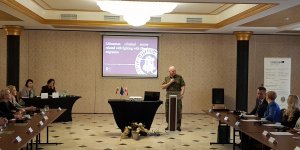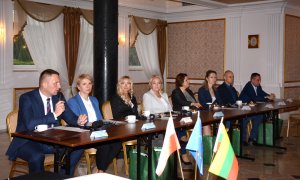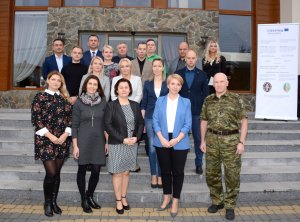Organizatorem wydarzeń jest Wydział Operacyjno – Śledczy Podlaskiego Oddziału Straży Granicznej. Mają ono na celu przybliżenie funkcjonariuszom polskim i litewskim, biorącym w nich udział, regulacji karnoprocesowych oraz administracyjnych związanych z nielegalną migracją z zakresu prawa polskiego i litewskiego, a także narzędzi współpracy międzynarodowej przydatnych w zwalczaniu tego zjawiska.
W charakterze wykładowców zostali zaproszeni prokuratorzy Prokuratur Okręgowych w Białymstoku i Suwałkach, sędzia Sądu Najwyższego na Litwie, przedstawiciele Uniwersytetów w Białymstoku, Kownie i Wilnie, Oficer Łącznikowy Polskiej Straży Granicznej przy Europolu w Hadze, kierownik Centrum Współpracy Służb Granicznych, Celnych i Policyjnych RP i LT z siedzibą w Budzisku oraz funkcjonariusze Komendy Głównej i Wydziału ds. Cudzoziemców. Szkolenie to jest jednym z szeregu tego typu przedsięwzięć, które mają się odbyć w ramach ww. projektu zarówno w Polsce jak i na Litwie. Ponadto w jego ramach ma zostać zakupiony sprzęt ułatwiający codzienną pracę funkcjonariuszy polskich i litewskich służb granicznych, m.in.: pojazd pościgowo-rozpoznawczy, pojazdy typu Schengen Bus, urządzenia do uzyskiwania danych z telefonów komórkowych, zestaw kamer, dron oraz inne.
Jednym z głównych celów projektu jest wzmocnienie zdolności instytucjonalnych w zakresie współpracy polsko-litewskiej w zakresie zwalczania przestępczości transgranicznej w regionach przygranicznych.
On 21st/22nd November 2019 and 5/6th December 2019 at the Borowinowy Zdrój Hotel in Supraśl, within the framework of the Project Cooperation of Lithuanian and Polish Border Guard Services no LT-PL-3R-199 co-financed from the funds of the Lithuania-Poland Interreg V-A Cooperation Programme, trainings "Issues related to legal practice in the field of illegal migration" took place. The events are organised by the Operational and Investigation Department of the Podlaski Regional Unit of the Border Guard. Its aim is to familiarize Polish and Lithuanian officers, participating in them, with criminal-process and administrative regulations related to illegal migration in the field of Polish and Lithuanian law, and also with tools of international cooperation useful in combating this problem.
Prosecutors of the District Prosecutor's Offices in Białystok and Suwałki, a judge of the Supreme Court in Lithuania, representatives of the University of Białystok, Kaunas and Vilnius, a liaison officer of the Polish Border Guard at Europol in The Hague, the head of the Centre for Cooperation of the Border Guard, Customs and Police Services of the Republic of Poland and the Republic of Lithuania in Budzisko and officers of the Headquarters and the Foreigners' Department were invited as lecturers. This training is one of a series of projects of this type to be carried out within the framework of the aforementioned project both in Poland and Lithuania. Moreover, under the project, equipment facilitating the daily work of officers of Polish and Lithuanian border services is to be purchased, including: a speeding and reconnaissance vehicle, Schengen Bus vehicles, devices for obtaining data from mobile phones, a set of cameras, drone and others.
One of the main objectives of the project is to strengthen institutional capacity in the field of Polish-Lithuanian cooperation in combating cross-border crime in border regions.


